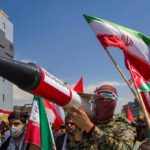One month after the floods, a Libyan climate activist looks back at what he saw, and at the bigger picture.
SIRTE, Libya
One month ago, my friend Mahmoud and I were both far from home, enjoying our time at a leadership training camp in Zuwara, a city in northwest Libya. Little did we know his home city of Derna was about to be washed away, sending us on a long journey into our country’s catastrophe.
Late on 10 September, news began to spread that flooding from a storm had hit the eastern city of Derna hard. But phone and internet lines were down, so we had no way of communicating with Mahmoud’s family, or to know just how bad it was.
As we’re both medical students, we thought we might be able to help. Instead of parting ways – I live in Sirte – we decided to head together for Derna, some 1,500 kilometres to the east.
We weren’t the only people who had this idea. Many cities in Libya were sending buses of volunteers to Derna and the nearby towns and cities. We joined one of them.
The roads were packed with compassionate people from western Libya who wanted to join the relief effort in the east. Cars were packed with food, water, and medicine. It was truly an unprecedented scene in our country, which has been torn apart by political, military, and social divisions.
As much as it was inspiring, the trip was also long and hard. Throughout the 33 hours it took us to reach Derna, Mahmoud was uncharacteristically quiet, consumed by worry. I tried to reassure him, saying the reports we had heard of death and destruction were most likely exaggerated. At that time, the worst accounts mentioned a death toll of 200.
Arrival in Derna
However, when we arrived in Derna, it became clear that things were much, much worse.
We spent our first night there in a mosque, planning to visit Mahmoud’s family in the morning. But we were woken early by a cry from outside: “Come here, come here!” We followed the voice, and found the body of a child.
Shocked, we stood there without speaking. The silence was only broken by the anguished cry of other young men who had run to the call. As we waited for a search and rescue team to take the child’s body away, I’ll never forget what one of them said: “This child is lucky to have died.”
I stood by his side for hours, as we looked out at what was once a vibrant city. There was nothing but mud.
When he eventually left this grizzly scene, survivors guided us towards Mahmoud’s home. The path was littered with rubble and mud. As we approached the centre of Derna, he began to weep.
Mahmoud could not speak. He just said: “Here. Where?” That’s when I understood that we were standing on the ruins of his home. He had lost his entire world in a single night.
I stood by his side for hours, as we looked out at what was once a vibrant city. There was nothing but mud. There were barely even any remnants of what had been there; no traces left to testify that this place had once teemed with existence. It was suffocating. The smell of death and blood was everywhere.
Survivors’ stories
Mahmoud spent the next few days searching for his family, only to find that they had all been killed – among the 4,000 who are now confirmed dead. Many more are still missing.
I spent the next week helping out wherever I was needed. At first, I was searching for the bodies or survivors. Then I was helping the professional rescue teams that started arriving. Later, I ended up providing first aid to rescuers who were frequently injured due to the dangerous conditions they faced as they attempted to find people.
They recalled seeing buildings adrift, full of terrified people, crashing into each other.
Survivors told me about the night of the storm. They described thunder and lightning, which at first seemed like a regular storm. But as dawn broke, the electricity cut off, the ground trembled, and the water that flows through Derna’s valley rose to terrifying heights. In a matter of minutes, they said, the city transformed into a nightmarish scene.
They recalled seeing buildings adrift, full of terrified people, crashing into each other. Screams that stopped when the structures collapsed.
Derna has seen war, but when the first of its two dams collapsed, people said it was a sound louder than any explosion. By the time the second dam collapsed, it was complete chaos.
A call to action
After a week, I could see that my help was no longer needed and I left Derna. I asked Mahmoud to come back home with me to Sirte, but he said a charity had offered to pay for his housing and the rest of his medical school. He wanted to stay in his home city. The money he had been offered was some small good in a massive tragedy.
Since then, I’ve been unable to get my week in Derna out of my head, thinking about what happened and why.
Geography played a part: Situated in the far east of Libya, Derna is nestled between mountains to the south and the sea to the north. The city lies in a valley and, as the storm approached, the rain began accumulating in smaller valleys before it converged in Derna’s main valley.
Derna’s dams had successfully prevented major flooding for hundreds of years. But the rainfall on that day was so heavy that they couldn’t handle the pressure.
Libyans have been demanding that those in charge of maintaining the dam be held responsible. Media coverage has highlighted issues of corruption and political exploitation.
But as a climate activist, who works to raise awareness in Libya about the problems of desertification and deforestation, I believe climate change has played a role too. It hasn’t been a major part of the discussion, and some people have even accused those who bring it up of trying to divert attention away from real accountability.
Libya, and the world, need to know that the harsh reality of climate change is here.
Tackling climate change and holding people accountable are not mutually exclusive. After all, it is humans who are causing climate change, which intensified the storm but was not the sole culprit. We also need better disaster preparedness, restrictions on construction in flood-prone areas, and dam maintenance.
Libya, and the world, need to know that the harsh reality of climate change is here. A month since our disaster, where thousands — including my friend Mahmoud’s entire family — died in one night, it’s essential to provide immediate aid to the tens of thousands who are now displaced and without homes.
But it’s also crucial that countries fulfil their commitments to reduce emissions. We must secure financing for climate adaptation, address the issues of loss and damage, and build infrastructure that can withstand the challenges of the heating climate.
My week in Derna, and what comes next, weighs on my conscience. It isn’t enough to lend a helping hand, as so many Libyans did. Our collective duty extends beyond the present, into protecting the rights of future generations to a healthy planet.
Source: The New Humanitarian











Add Comment